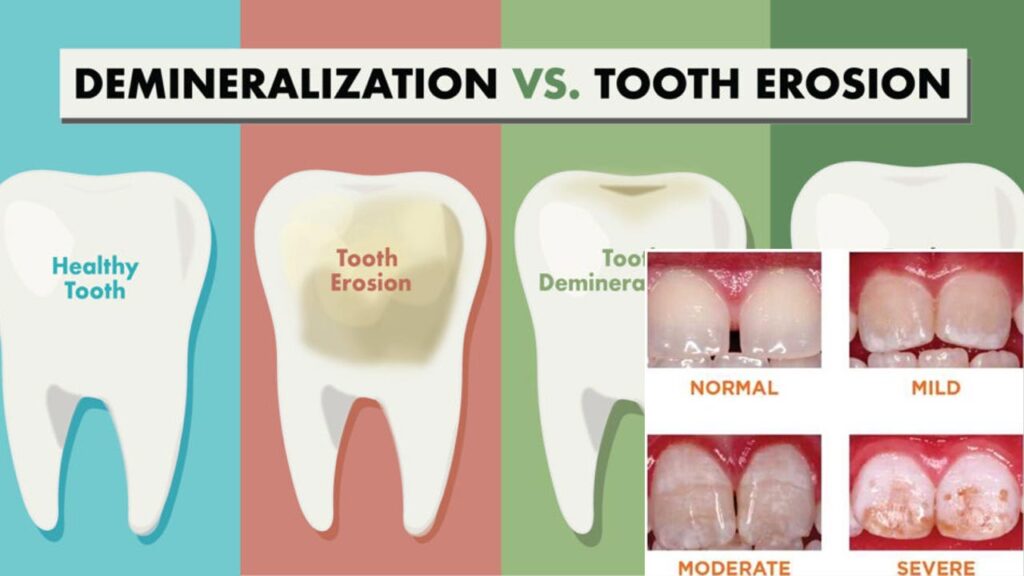Your teeth are composed of several layers, with enamel being the outermost and hardest layer that protects your teeth from decay, sensitivity, and wear and tear. While it is the strongest substance in the human body, it can be worn down by various factors, leading to enamel erosion. When this happens, it exposes the underlying layer of your teeth, called dentin, making your teeth susceptible to decay, sensitivity, and discolouration.
In this blog post, we’ll explore the signs and symptoms of enamel erosion, its causes, and what you can do to prevent and treat it.
Signs and Symptoms of Enamel Erosion
Sensitivity to hot and cold foods

One of the most common signs of enamel erosion is sensitivity to hot and cold foods. This occurs when the enamel wears away, exposing the sensitive layer of your teeth, called dentin.
Discolouration or yellowing of teeth
Another sign of enamel erosion is the discolouration or yellowing of teeth. As enamel wears away, it exposes the dentin, which is naturally yellow.
Cracks or chips in the teeth
Enamel erosion can also cause cracks or chips in the teeth, which can be painful and lead to further damage if left untreated.
Rough or uneven edges
If you notice rough or uneven edges on your teeth, it could be a sign of enamel erosion. This can cause discomfort or pain when you bite or chew.
Rounded teeth
Enamel erosion can cause the edges of your teeth to become rounded, which can affect your bite and lead to further dental problems.
Transparent or see-through edges
When enamel wears away, the edges of your teeth can become transparent or see-through, which is a clear sign of enamel erosion.
Causes of Enamel Erosion
Acidic foods and beverages
Acidic foods and beverages, such as citrus fruits, soda, and sports drinks, can wear away your enamel over time.
Dry mouth or low saliva production
A dry mouth or low saliva production can cause enamel erosion because saliva helps to neutralize acids in your mouth.
Genetics
Some people are more prone to enamel erosion due to genetic factors.
Certain medications
Certain medications, such as antihistamines, can cause dry mouth, which can lead to enamel erosion.
Gastrointestinal problems
Gastrointestinal problems such as acid reflux can expose your teeth to stomach acid, which can wear away your enamel.
Brushing too hard
Brushing your teeth too hard or using a hard-bristled toothbrush can cause enamel erosion over time.
Diagnosis of Enamel Erosion
Dental exam
Your dentist can diagnose enamel erosion during a routine dental exam by looking for signs such as discolouration, cracks, and chips.
X-rays
X-rays can help your dentist identify enamel erosion and determine the extent of the damage.
Clinical tests
Your dentist may also perform clinical tests, such as a bite test, to check for enamel erosion.
Prevention and Treatment of Enamel Erosion
Maintaining good oral hygiene is one of the most important steps you can take to prevent enamel erosion. This includes brushing your teeth twice a day with a soft-bristled toothbrush, flossing daily, and using fluoride toothpaste and mouthwash. Fluoride helps to strengthen your enamel and protect it from erosion.
Avoiding acidic foods and beverages, such as soda, citrus fruits, and sports drinks, can also help prevent enamel erosion. If you do consume acidic substances, drink water afterwards to help neutralize the acid in your mouth.
Chewing sugar-free gum after meals can also help prevent enamel erosion by stimulating saliva production, which helps to neutralize acids in your mouth.
If your enamel erosion is severe, your dentist may recommend bonding or filling to repair the damage. Dental crowns or veneers may also be necessary to protect your teeth from further damage.
healthcareDental health is an important aspect of overall health and well-being. Take control of your dental health with our top-quality dental health care products. Say goodbye to painful and inconvenient dental issues and hello to a brighter, healthier smile.
These products are designed with the latest technology and are made from premium materials, ensuring that you get the best results. Whether you’re looking for a solution for sensitive teeth, gum health, or just want to keep your smile sparkling, our dental health care products have got you covered.
Tired of hiding your smile due to yellowing, stained, or sensitive teeth?
ProDentim is here to help. This advanced formula whitens and strengthens your teeth, while also reducing sensitivity and promoting oral health. Say goodbye to expensive and painful dental treatments, and start enjoying a bright, confident smile with ProDentim.
Click Here to Try ProDentim now and see the results for yourself!
Struggling with tooth sensitivity, gum problems or bad breath?
Dentitox Pro is the solution you need. This natural, effective formula helps to clean and strengthen your teeth and gums, giving you a brighter, healthier smile. Dentitox Pro is made with the finest ingredients and is free from harmful chemicals, making it safe and gentle for everyday use. Say goodbye to pain and embarrassment, and start enjoying a confident, beautiful smile with Dentitox Pro.
Click Here to Order now and get 20% off your first purchase!
Click Here for Professional Teeth Whitening
Frequently Asked Questions
How can I prevent enamel erosion?
To prevent enamel erosion, you should maintain good oral hygiene, avoid acidic foods and beverages, drink water after consuming acidic substances, and chew sugar-free gum. You should also see your dentist regularly for check-ups and cleanings.
Can enamel erosion be reversed?
Enamel erosion cannot be reversed, but it can be prevented from getting worse. If the damage is severe, your dentist may recommend treatments such as bonding, filling, or dental crowns to protect your teeth.
What happens if enamel erosion is left untreated?
If enamel erosion is left untreated, it can lead to tooth decay, sensitivity, and discolouration. Severe cases can also lead to tooth loss.
How do I know if my enamel is thinning?
Some signs of enamel thinning include sensitivity to hot and cold foods, discolouration or yellowing of teeth, cracks or chips in the teeth, rough or uneven edges, rounded teeth, and transparent or see-through edges.
Is enamel erosion common?
Enamel erosion is a common dental problem, especially among people who consume acidic foods and beverages, have dry mouths, or brush their teeth too hard.
Enamel erosion is a common dental problem that can lead to a host of other dental problems if left untreated. If you suspect that you have enamel erosion, it’s important to see your dentist for a diagnosis and treatment plan. By maintaining good oral hygiene, avoiding acidic substances, and seeing your dentist regularly, you can help prevent enamel erosion and protect your teeth from further damage.
